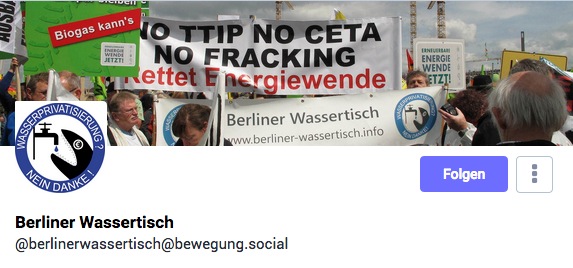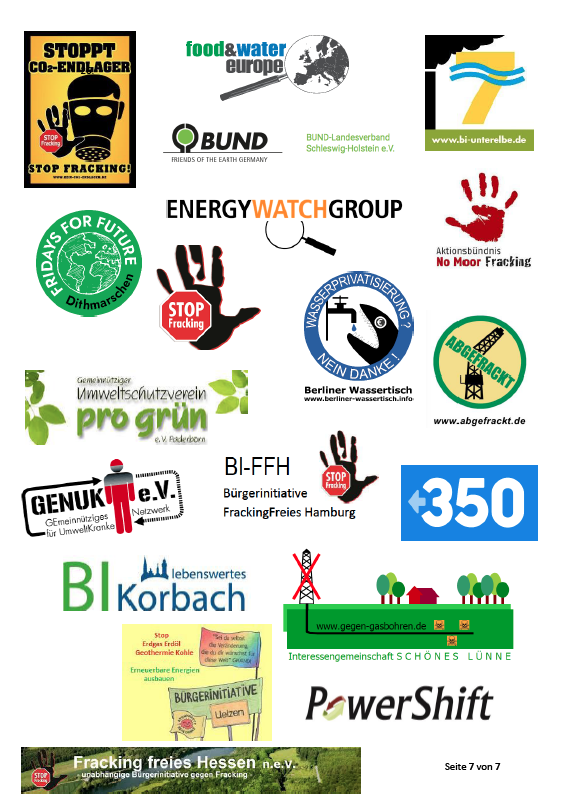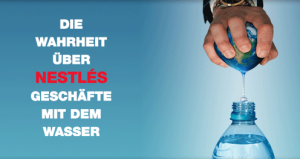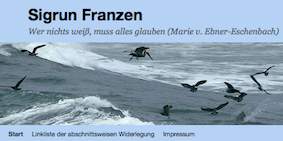Privatsphäre stärkt, Überwachung schwächt! #StopScanningMe

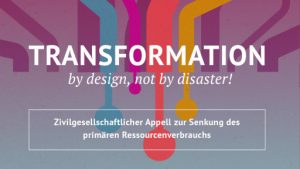
Suche

Schiefergas-Fracking in Deutschland?
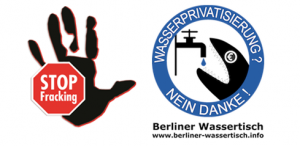
#StopEUMercosur Erklärung
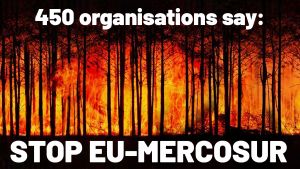
Aktion Greenpeace: #StopEUMercosur

#SaveTheOkavangoDelta
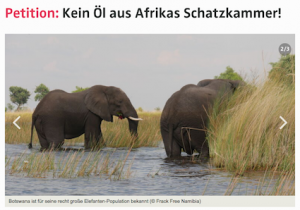
Erfolgreich! Über 1 Million Unterschriften „Green Deal“ – Europäische Bürgerinitiative (EBI)
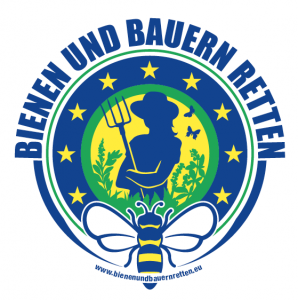
Stop Energiecharta. #NoECT. Wir wollen raus aus dem Anti-Klimaschutz-Vertrag
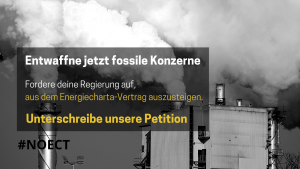
Europäische Bürgerinitiative gegen biometrische Massenüberwachung (17.2.2021-17.2.2022)
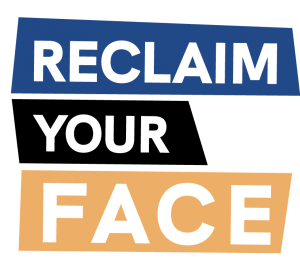
Lebensgefährliche Entwicklung: Gewinnorientierung im Krankenhaus
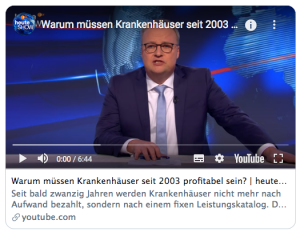
- Wassertisch-Plenum,
im NewYorck / Bethanien Mariannenplatz 2A
10997 Berlin Openstreetmap fällt coronabedingt aus Überblick (Messstellen: Oberflächengewässer und Grundwasser)

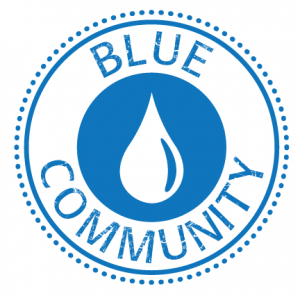
-
Letzte Beiträge
- AöW zum Weltwassertag 2023: Interkommunale Zusammenarbeit noch stärker ermöglichen
- Greenpeace: Fracking – eine unterirdisch schlechte Idee
- Bürgerinitiative gegen CO2-Endlager: Offener Brief an den Bundesminister für Wirtschaft und Klimaschutz Dr. Robert Habeck
- BUND gegen CCS-Endlager
- Jürgen Knirsch: CETA-Handelsabkommen: Eine trügerische Wette auf die Zukunft (Leserbrief an die SZ vom 8.12.2022)
- Neuere Materialien und Dokumente zur CETA-Debatte
- TAZ: Hamburger Abgeordneter über Olympia-Gedankenspiele: „Es kommt zu Vertreibungen“
- NDR: Bewirbt sich Hamburg noch einmal um Olympische Spiele?
- NGO-Bündnis fordert mit gemeinsamen Appell die Senkung des absoluten Ressourcenverbrauchs
- Allianz der öffentlichen Wasserwirtschaft warnt vor CETA: Mit dem jetzigen CETA-Text wird der Schutz der öffentlichen Wasserwirtschaft vor einer Kommerzialisierung weiter geschwächt
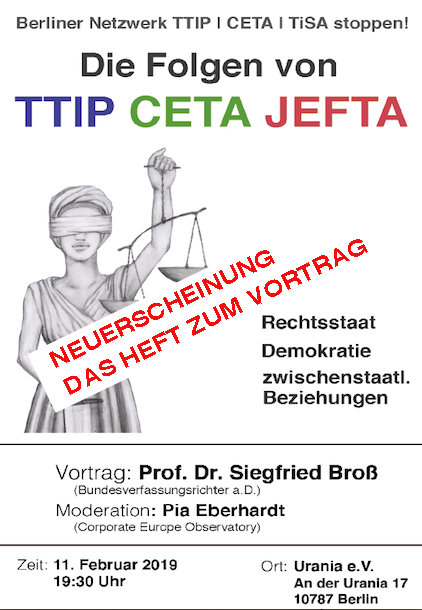
Delius-Klage
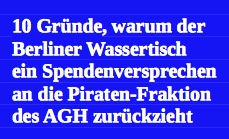
Keine Steuergelder für LNG-Fracking-Gas Terminals in Deutschland!
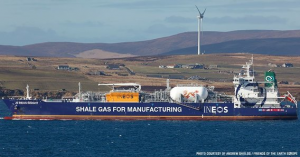
RSS-Feeds
Monatsarchive: Juli 2014
TTIP und CETA. Angriff auf den Klimaschutz
Ein – wie immer – lesenswerter Artikel von Silvia Liebrich zum Thema Freihandelsabkommen TTIP und CETA
Süddeutsche Zeitung
19.07.2014
Ölindustrie und Freihandel. Angriff auf den Klimaschutz
Von Silvia Liebrich
Eine Studie zeigt: Die Ölindustrie will das geplante Freihandelsabkommen TTIP nutzen, um Klimaschutz-Vorschriften auszuhebeln. Vor allem die mächtige Lobby aus den USA legt sich dafür kräftig ins Zeug.
Zum Artikel
Bundesverband mittelständische Wirtschaft (BVMW) lehnt ISDS ab!
Selbst der Bundesverband für mittelständische Wirtschaft sagt No2ISDS!
Das belegt erneut, dass ISDS nur im Sinne von Großkonzernen, profitorientierten ISDS-Schiedsrichtern und Anwaltsfirmen ist!
Bundesverband mittelständische Wirtschaft (BVMW)
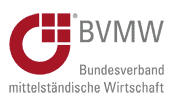
Freihandelsabkommen TTIP
„Der Mittelstand lehnt den geplanten Investitionsschutz für Unternehmen im transatlantischen Freihandelsabkommen zwischen den USA und der EU (TTIP) ab. Die geplanten Regelungen zum Investitionsschutz benachteiligen die mittelständische Wirtschaft.
Hier finden Sie das Positionspapier (PDF), das der BVMW bei der EU-Kommission im Rahmen eines Konsultationsverfahren eingereicht hat.“
Dreckiges Öl und Teersande „dank“ TTIP und CETA
Neuer Bericht der Umweltorganisationen aus Europa, Kanada und den Vereinigten Staaten Council of the Canadians, Friends of the Earth, Greenpeace, Sierra Club und Transport & Environment
17.07.2014
Jürgen Knirsch (Greenpeace e.V.): „Der Report (in englischer Sprache) zeigt auf, wie die laufenden Verhandlungen zu den Freihandelsabkommen mit den USA (TTIP) und Kanada (CETA) benutzt werden, um den Import von dreckigem Öl aus Teersand und Ölschiefer zu ermöglichen und damit die Klimaschutzzeile der EU unterlaufen werden (siehe nachstehende Presserklärung)“
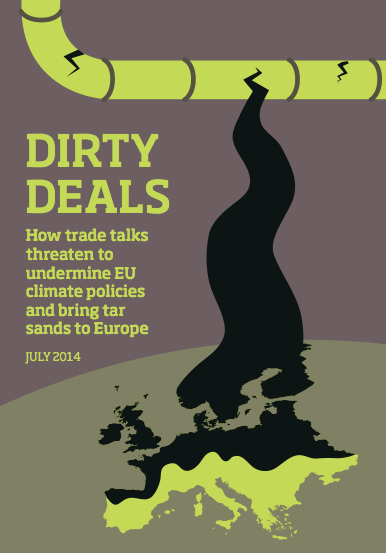 Dirty Deals: How Trade talks threaten to undermine EU climate policies and bring tar sands to Europe
Dirty Deals: How Trade talks threaten to undermine EU climate policies and bring tar sands to Europe
This briefing demonstrates how corporate lobby groups are using trade threats, and particularly the EU-US trade talks as a vehicle to attack, weaken and delay important environmental regulation still in the making. The Fuel Quality Directive has already being delayed and potentially weakened threatening EU climate policies and an influx of tar sands to Europe.
Zum Artikel
Der Report kann hier (pdf) heruntergeladen werden.
Pressemitteilung:
Press Release: US and Canada using trade talks to weaken EU climate legislation
Oil lobbyists pushing polluting tar sands oil on Europe
Brussels/Washington, Thursday July 17, 2014 – The United States and Canadian governments are using ongoing trade talks to push the European Union to allow devastating tar sands unfettered access to its market, according to a new report out today [1].
As trade negotiations between the EU and US on a transatlantic trade treaty continue in Brussels this week, the research by European and North American environmental organisations reveals how Canada and the US have been using trade talks to pressure Europe to weaken its climate policy.
Urged on by the oil industry, they have successfully delayed and potentially weakened key EU legislation aimed at reducing greenhouse gas emissions from transport fuels.
Despite official denials of having objected to Europe’s proposed regulations, access to documents requests reveal that the US government has sought to weaken a European policy to clean up transport fuels that would effectively curtail the import of tar sands and other dirty fuels into Europe.
In a letter last week 11 members of the US Congress questioned the US Trade Representative about attempts to influence EU climate policy. They expressed concern that the US position could undermine EU efforts to reduce carbon pollution, and made clear that pressuring the EU to alter its Fuel Quality Directive would be inconsistent with the goals of President Obama’s Climate Action Plan [2].
Other evidence suggests Canada has used threats of WTO action as well as its bilateral trade negotiations to put pressure on the EU to remove all disincentives to imports of tar sands oil – one of the most climate polluting fuels on the planet. The pressure has taken the form of intense lobbying and scaremongering about the alleged damage caused by the EU’s Fuel Quality Directive [3].
„The sustained attacks by the US and Canada on the European Union’s key legislation on transport fuel emissions seem to be paying off. Europe is again failing to stand up effectively for its own climate policy. The trade agreement with the US is being used as a Trojan horse to bring dirty tar sands imports to Europe’s shores. Clean fuel rules might just be the first EU policy dismantled by this trade deal, even before it is agreed,“ said Fabian Flues of Friends of the Earth Europe.
„Tar sands oil is one of the most climate-polluting fuels on the planet. It’s shocking that the U.S. is pushing the EU to weaken its climate rules just as the Obama administration is talking up its commitment to tackle climate disruption. The U.S. is using the trade deal to back the oil industry at the expense of the families and communities already affected by climate disruption,“ said Ilana Solomon of the Sierra Club.
The EU is negotiating separate trade agreements with Canada and the US – the Comprehensive Economic and Trade Agreement (CETA) with Canada, and the Transatlantic Trade and Investment Partnership (TTIP) with the US.
The proposed trade agreements will impact many aspects of the life of citizens on both sides of Atlantic, including food, energy, consumer goods, and financial services as well as paying compensation for the investment failures of foreign companies. Yet, they are being held behind closed doors without access for citizens, national parliaments or lawmakers [4].
Leaked documents made public last week show that the EU is seeking to use trade talks with the US to allow for increased imports of US oil and gas which would keep the EU dependent on high levels of fossil fuel imports [5].
„The Commission always says free trade deals do not undermine the ‚right to regulate‘. Fine. But the real issue is they create‘ fright to regulate‘, and what is happening to the FQD is a perfect example,“ said Jos Dings of Transport & Environment, a member of the European Commission’s TTIP Advisory Group.
“This attack on Europe’s right to regulate its transport fuel market is just one example of how some companies intend to use an EU-US trade deal to dismantle environmental, health and labour protection. The reality is that the few remaining trade barriers between Europe and the US could well be removed without an agreement like TTIP whose economic benefit would be minuscule. A trade deal that works against everyone’s interest to maximise the profits of a handful of corporations makes no sense,“ said Juergen Knirsch of Greenpeace.
***
For more information please contact:
Fabian Flues, corporate campaigner for Friends of the Earth Europe,
Tel: +32 (0)2 893 1024, email: fabian.flues@foeeurope.org
Jos Dings, Director of Transport & Environment (T&E)
Tel: +32 (0)498 51531, email: Jos.dings@transportenvironment.org
Dan Byrnes, Sierra Club
Tel: +1 202-495-3039, email: dan.byrnes@sierraclub.org
Juergen Knirsch, Greenpeace
Tel: +49 (0)171 87 80 816, email: juergen.knirsch@greenpeace.org
Bill Waren, senior trade analyst, Friends of the Earth, U.S.
Tel: +1-202 222 0746, email: wwaren@foe.org
***
Notes:
[1] Dirty Deals: How Trade talks threaten to undermine EU climate policies and bring tar sands to Europe is online at: https://www.foeeurope.org/dirty_deals_170714
[2] Sheldon Whitehouse, Members of Congress Press U.S. Trade Rep on Tar Sands Policy, July 2014: http://www.whitehouse.senate.gov/news/release/members-of-congress-press-us-trade-rep-on-tar-sands-policy
[3] The Fuel Quality Directive, part of Europe’s package of climate measures agreed in 2009, aims to reduce the greenhouse gas emissions from Europe’s transport fuels. Previous proposals for implementation were rejected in 2012 after intense lobbying by Canada and the oil industry.
The European Commission is now considering new proposals to implement the Fuel Quality Directive. According to media reports they no longer contain a key provision to discourage the use of tar sands oil and other extremely climate-damaging fuels in Europe.
Reuters, EU proposal scraps mandatory ‚dirty‘ label for tar sands, June 2014: http://uk.reuters.com/article/2014/06/05/eu-tarsands-idUKL6N0OC18M20140605
[4] Friends of the Earth Europe, Who’s driving the EU-US trade talks? July 2014: http://www.foeeurope.org/whos-driving-eu-us-trade-talks-070714
[5] Friends of the Earth Europe, Leaked trade document exposes dangerous EU energy proposal, July 2014: http://www.foeeurope.org/leaked-trade-document-exposes-dangerous-EU-energy-proposal-080714
The organisations are concerned that the Transatlantic Trade and Investment Partnership (TTIP) negotiations are already being used to open up new avenues for dangerous industry proposals at the expense of the protection of workers, consumers and the environment. Examples include proposals for permanent regulatory cooperation between the EU and the US, and granting foreign investors special privileges that would allow them to sue host governments in secret corporate courts for regulatory decisions that they take in the public interest.
Friends of the Earth Europe, Over 23,000 say no to excessive investor power, July 2014: http://www.foeeurope.org/23000-say-no-excessive-investor-power-140714
Transnational Institute, Proposed Plans for U.S./EU Trade Deal Would Weaken Health, Consumer, Worker and Environmental Protections, May 2014: http://www.tni.org/pressrelease/proposed-plans-useu-trade-deal-would-weaken-health-consumer-worker-and-environmental
Juergen Knirsch
Kampaigner Sonderprojekte
Special Projects Campaigner
T: +49 40 306 18 393
F: +49 40 306 1819 393
M: +49 171 8780 816
Michael Efler about press conference (ECI) in Brussels
Dr. Michael Efler (Mehr Demokratie e.V., member of the ECI-committee)
Dear Partners and Friends,
on Tuesday, 15 July 2014 we held our press conference in Brussels to officially launch the European Citizens‘ Initiative against TTIP and CETA. At the same time, we registered the ECI at the European Commission.
The conference was a success. The room was completely crowded and many journalists from different countries were represented. During the conference, our panelists Susan George, Michael Efler and John Hilary of the citizens‘ committee talked about the ECI and answered many questions that were asked by the audience and via the live-chat.
The journalists that were present at conference were for example from the press agency Reuters and from the German broadcasting companies ZDF and MDR. After the conference, the panelists gave a number of interviews to journalists. Here´s the link to the Reuter´s article on our press conference: http://www.reuters.com/article/2014/07/15/us-eu-usa-trade-idUSKBN0FK1S920140715
In case you were not able to follow the press conference on Tuesday, you can watch the full video at http://stop-ttip.org/livestream-chat/. Moreover, all the press material is available under the following link: http://stop-ttip.org/press/
Please let us know if there were any news reports about the ECI in your own country as a result of the press conference.
What’s happening next
The European Commission now has to decide if it will register our ECI. This can take up to two months. In the meantime, we will start with the thorough preparations of the signature collection phase, which will begin in September – in case of a positive response by the Commission. We will of course keep you posted on all important issues concerning the signature collection and provide you with suggestions how you can get involved as an organization.
Moreover, it would be great if you can continue to share our Facebook and Twitter channels: https://www.facebook.com/eci.ttipand @ECI_TTIP. Both channels are growing relatively fast (2,191 fans on Facebook and 262 Twitter followers) but of course we need to reach out to many more people.
If you have any further questions, feel free to contact us directly. You can reach Michael Efler at More Democracy (michael.efler@mehr-demokratie.de), Maritta Strasser at Campact (strasser@campact.de) and Karl Bär at the Munich Environment Institute (kb@umweltinstitut.org). In addition, you can contact Lisa Albers at More Democracy (lisa.albers@mehr-demokratie.de) who manages the mailing list.
Best regards,
Lisa Albers/Michael Efler
P.S.: Our alliance is still growing. 156 organizations supporting the ECI and of course we still want more 🙂
— ====================================================== Mehr Demokratie e.V. Dr. Michael Efler Bundesvorstandssprecher Haus der Demokratie und Menschenrechte Greifswalder Str. 4 10405 Berlin Tel.: 030 42082370 Fax: 030 42082380 Mobils: 0173 961 0454 Mail: michael.efler@mehr-demokratie.de Web: http://www.mehr-demokratie.de Besuchen Sie uns auch auf: YouTube: https://www.youtube.com/mehr0demokratie0de Facebook: https://www.facebook.com/mehrdemokratie Twitter: https://twitter.com/volksentscheid
Medikamenten-Entsorgung: Verbraucherwissen mangelhaft
Institut für sozial-ökologische Forschung
27.05.2014
Medikamenten-Entsorgung: Verbraucherwissen mangelhaft
Arzneimittelrückstände im Wasser sind ein weltweites Umweltproblem. Auch in Deutschland werden mehr als 150 verschiedene Wirkstoffe in nahezu allen Gewässern nachgewiesen, bis hin zum Grund- und Trinkwasser. Die Spurenstoffe aus Schmerzmitteln, Antibiotika, blutdrucksenkenden Mitteln oder Psychopharmaka stammen meist aus häuslichen Abwässern – doch viele Verbraucher wissen gar nicht, dass sie die Verursacher sind. Eine repräsentative Befragung des ISOE – Institut für sozial-ökologische Forschung hat große Wissenslücken im Umgang mit Arzneimitteln ausgemacht.
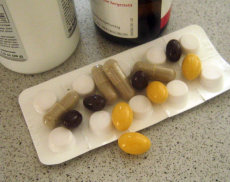
Es ist ein unerwünschter Nebeneffekt beim Gebrauch von Medikamenten: Der Wirkstoff wird nicht vollständig vom Körper abgebaut und über den Urin direkt oder als Abbauprodukt wieder ausgeschieden. Über das Abwasser fließen die Arzneimittelwirkstoffe in die Kläranlagen, wo die Vielzahl an chemischen Verbindungen nicht vollständig entfernt werden kann. Mit dem Ablauf aus den Kläranlagen in die Flüsse und Seen finden die Rückstände so wieder zurück in die Umwelt und den Wasserkreislauf.
zum Artikel…
Kommentar Wassertisch: Es ist ein Skandal, dass Apotheken seit 2009 nicht mehr verpflichtet sind, abgelaufene Medikamente kostenfrei zu entsorgen und die Öffentlichkeit nicht genügend darüber aufgeklärt wird, dass sowohl feste wie flüssige(!) Medikamente über den Restmüll entsorgt werden müssen, um das Trinkwasser nicht zu belasten.
Millionenprofite mit Müllgebühren. Und ewig zahlt der Bürger
ZDF / Frontal 21
15.07.2014
Millionenprofite mit Müllgebühren. Und ewig zahlt der Bürger
Müllverbrennungsanlagen erwirtschaften spektakuläre Millionengewinne mit Hausmüll – zulasten der Abfallgebührenzahler. Dabei sind übermäßige Gewinne mit Gebühren verboten, die Gebühren müssen kostendeckend sein. Nachdem Frontal21 diesen Skandal erstmals 2008 aufgedeckt hatte, wurden Behörden aktiv und eröffneten sogenannte Preisprüfungen zu den Müllverbrennungsanlagen Bielefeld und Oberhausen. Doch diese amtlichen Preisprüfungen wurden nach Frontal21-Recherchen verschleppt und sogar manipuliert – zum Nachteil der Gebührenzahler.
Zum Artikel
Zum Video
FR: Freihandelsabkommen TTIP: Vereint gegen den Freihandel
Frankfurter Rundschau
17.07.2014
Freihandelsabkommen TTIP: Vereint gegen den Freihandel
Von Stefan Sauer
Eine europäische Bürgerinitiative will die Freihandelsabkommen TTIP und Ceta mit den USA und Kanada stoppen. Welche Ziele hat das Bündnis? Wie sind die Erfolgsaussichten? Wir beantworten die wichtigsten Fragen. […]
Gabe es schon einmal einen EBI-Erfolg?
Genau einmal. Das europäische Bürgerbegehren gegen die Wasserprivatisierung bewegte den zuständigen EU-Kommissar Michel Barnier im Januar dazu, die Wasserversorgung aus der EU-Konzessionsrichtlinie herauszunehmen. Allerdings könnte die Privatisierung über das TTIP doch noch kommen.
Zum Artikel
Aufklären, nicht abhören
Süddeutsche Zeitung
16.07.2014
Freihandelsabkommen TTIP
Aufklären, nicht abhören
ein Kommentar von Silvia Liebrich
In Deutschland wächst die Furcht vor abhörwütigen Amerikanern. Das Thema betrifft auch die Freihandelsgespräche. Sie sollten deshalb ausgesetzt werden – bevor die Vertrauenskrise eskaliert.
Freier Handel ist eine feine Sache. Er kann Vertrauen schaffen und den Wohlstand mehren. Er sorgt dafür, dass Länder nicht nur Waren austauschen, sondern sich auch so näherkommen, weil sie mehr Verständnis für die Kultur des anderen entwickeln. Es gibt genug Beispiele in der Wirtschaftsgeschichte, die zeigen, dass alle Seiten profitieren – wenn sie nur fair und offen miteinander umgehen. Freier Handel kann auch entscheidend dazu beitragen, politische Konflikte zu entschärfen. Im besten Fall lässt er sie erst gar nicht entstehen.
So weit die Theorie. Was aber, wenn das Vertrauen auf der Strecke bleibt, weil ein Partner den anderen hemmungslos ausspioniert und hintergeht? Genau das geschieht derzeit im Umfeld des geplanten Freihandelsabkommens zwischen den USA und der Europäischen Union, kurz TTIP.
moma-Reporter: Nicht kleckern, klotzen – Fracking in den USA
Ein Medientip zum Thema Fracking.
(Mit einem herzlichen Dank an den Zuschauer, der uns darauf aufmerksam gemacht hat!)
Das Erste / Morgenmagazin
16.07.2014
moma-Reporter: Nicht kleckern, klotzen – Fracking in den USA
Zum Beitrag
Es formiert sich Widerstand gegen TTIP
Süddeutsche Zeitung
15.07.2014
Freihandelsabkommen mit USA. Wie Bürger TTIP stoppen sollen
Von Matthias Kolb
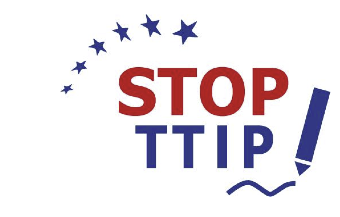 Widerstand formiert sich: Mit Unterschriften wollen europäische Aktivisten das geplante Handelsabkommen mit den USA zu Fall bringen. Dazu muss auch in Süd- und Osteuropa die Wut wachsen.[…]
Widerstand formiert sich: Mit Unterschriften wollen europäische Aktivisten das geplante Handelsabkommen mit den USA zu Fall bringen. Dazu muss auch in Süd- und Osteuropa die Wut wachsen.[…]
Zum Artikel
Auswertung der Großen Anfrage der LINKEN zu TTIP
Da es nicht jedem liegt, sich durch 63 Seiten zu kämpfen, stellt die Fraktion DIE LINKE eine Auswertung bereit:
Auswertung der Antwort der Bundesregierung auf die Große Anfrage der Fraktion DIE LINKE »Soziale, ökologische, ökonomische und politische Effekte des EU-USA Freihandelsabkommens«
Sie ist HIER nachlesbar!
Eine kompakte Kommentierung dazu hat der stellvertretende Fraktionsvorsitzenden Klaus Ernst in seinem Beitrag Freihandelsabkommen – zwischen Diplomatie und Mafia verfasst.
Passend dazu: Martin Greive: Gabriel (SPD) kämpft weiter FÜR Abkommen mit den USA (TTIP). In: Die Welt, 10.07.2014.
Ja, so kennt man die Sozialdemokraten….
Heute EBI-Registrierung StopTTIP StopCETA
Hier die aktuelle Pressemitteilung der Europäischen Bürgerinitiative StopTTIP/StopCETA, bei der auch der Berliner Wassertisch mitmacht
Europäische Bürgerinitiative STOP TTIP
Pressemitteilung, 15.7.2014
Europäische Bürgerinitiative fordert Verhandlungsstopp bei TTIP und CETA
EBI-Registrierung am 15. Juli 2014 – Kritik: mangelnde demokratische Beteiligung und Aushöhlung von Standards
Am heutigen Dienstag (15. Juli) hat die 47. Europäische Bürgerinitiative (EBI) ihren Antrag auf Registrierung bei der Europäischen Kommission gestellt. Die Initiative „Stop TTIP“ fordert die EU-Kommission auf, dem EU-Ministerrat zu empfehlen, das Verhandlungsmandat über die Transatlantische Handels- und Investitionspartnerschaft (TTIP) aufzuheben und auch das umfassende Wirtschafts- und Handelsabkommen (CETA) nicht abzuschließen. Hinter der Initiative stehen knapp 150 Organisationen aus 18 EU-Mitgliedsländern. In Deutschland koordinieren die Organisationen Attac, Campact, BUND, Mehr Demokratie e.V., das Umweltinstitut München und der Naturschutzbund Deutschland e.V. (NABU) die EBI. Auch Brot für die Welt, der Deutsche Kulturrat und die GEW gehören dem stetig wachsenden Bündnis an. […]
Pressemitteilung (pdf, deutsch)
Press release (pdf, english)
Die Bündnisliste kann man HIER (pdf) einsehen (Stand: 15.07.2014)
Trinkwasser darf nicht von Vattenfall bedroht sein
03.07.2014
Sulfatbelastung der Spree
Silke Gebel (MdA, Grüne) berichtet über die Sulfatbelastung des Trinkwassers
Die Berliner Trinkwasserversorgung ist derzeit noch nicht akut bedroht durch die Sulfatbelastung der Spree. Die Berliner Wasserbetriebe können einen Wert von max.150 mg/l gewährleisten, erklärte Elke Wittstock Leiterin des Schwerpunktwasserwerks Friedrichshagen am Freitagabend bei einer Fachdiskussion im Köpenicker Ruderclub Ägir. Im Landkreis Oder-Spree sieht die Lage indes dramatischer aus. Dort wird in großem Umfang Uferfiltrat der Spree für die Trinkwassergewinnung genutzt, was zu höherer Sulfatbelastung führt.


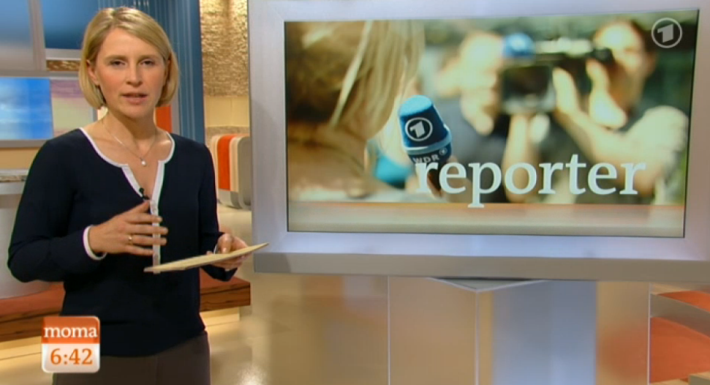
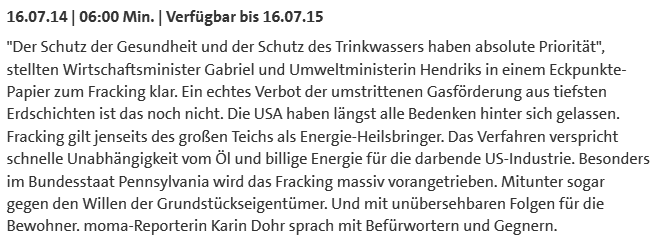
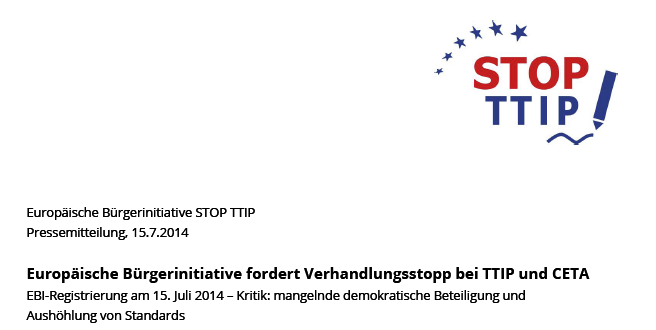
 Pressemitteilungen
Pressemitteilungen